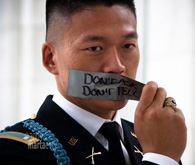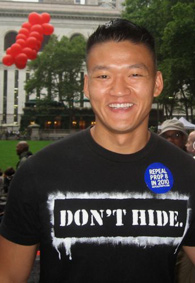On 19 March 2009, the Rachel Maddow Show featured an appearance by a young Korean American army officer named Dan Choi. He is a graduate of the West Point Military Academy, an Arabic linguist and an Iraq war veteran, still serving with the National Guard. He is also gay.

He’d decided to come out publicly to the world to protest Don’t Ask Don’t Tell (DADT), the US Armed Forces policy against hiring openly gay individuals. “It is an immoral code and goes up against every single [thing] that we were taught at West Point with our honour code,” he told a rapt nation.
Sure enough, a month after his coming on television, Choi was discharged. In the two years that followed, he became known as the anti-DADT movement’s most visible protester. He was already a founding member of Knights Out, a group for GLBT West Point Academy graduates, but now he was also granting interviews left and right, speaking at rallies and universities, organising protest marches and leading pride parades.
Most infamously, he and his fellow GLBT soldiers chained themselves to the White House Fence while in uniform – a stunt which they repeated several times, earning them nights in jail and days in the courtroom. He even went on a seven-day hunger strike with fellow activist Captain Jim Pietrangelo.
Such acts have made him a pretty controversial figure among the American gay activist community, a few of whom have labelled him as a mere attention-seeker. Regardless, his methods seem to have worked. DADT was officially repealed on 22 December 2010, with full implementation on 20 September 2011.
Choi isn’t shutting up yet, though. He’s just sent out a mailer declaring his New Year’s resolution: “More Troublemaking!” He’s demanding that the military adopt an official anti-discrimination policy. He’s spoken out against the anti-Asian bullying that led to the suicide of Chinese American soldier Pvt Danny Chen. He’s protested the treatment of Pfc Bradley Manning, the gay soldier who leaked a cache of official documents to Wikileaks. He’s spoken at Occupy Wall Street Los Angeles and been beaten and arrested for attending the banned Moscow Pride Parade.
And all through this, he’s also tried to return to the army. He’s tried to re-enlist twice, but he’s been turned down because he’s involved in trials regarding his activism. What will happen in 2012? We’ll be following his trail to find out.
æ: Age, sex, location?
Dan: 30, male, NYC.
æ: You’ve said before that being Asian influenced your decision to join the army. Could you tell us more?
Dan: I always felt ostracised because of my Asian identity at school, growing up even in diverse areas of Orange County, CA. Asian men are not represented in the media, except for the occasional karate or kung-fu master, and maybe the stereotypes of "the foreigner."
I felt we should represent ourselves not only in the media but in the professions of service, and patriotic obligation. The military was one way to accomplish that. I knew I was gay but the decision to go to the army was mostly because I was "openly Asian."
æ: How did you become an activist?

Dan: At age 27 I came home from Iraq and found love. Under DADT I was not able to express the truth of my love. In fact, DADT forced me to lie: actively lie about my love and my identity.
I still wanted to go back to Iraq, to keep serving on active duty and help the mission and the team by translating Arabic, serving as an infantry officer. But I thought about Matthew, my boyfriend. Would I tell my commander that I had a girlfriend, and the flag should go to someone that was not Matthew? Would I create a false persona of a girlfriend? Would I keep lying in order to serve?
I tried to. I told my friends about "Martha". Of course, they didn't believe the name was real! They pressured me: they said: "Let's have a double date, and let's meet this 'Martha'! We want to know your girlfriend too." The pressure was relentless, because a good commander and good battle buddy will make sure he knows the families of his teammates and subordinates. I finally said, "Martha doesn’t like army guys!" (This made no sense, but they dropped the issue.)
I realised under DADT, it was fine to keep my individual identity secret. I did it for 10 years. It was only when I fell in love that I understood how toxic the entire policy was. Then I understood it as active lying. I couldn't make excuses for the army any more. I could keep saying, “To lie about being gay is a good lie, a white lie." I was lying about the most important person in my life. I forced him to not exist, and this was the greatest disrespect and absence of love that I could ever imagine.
Now that I look back on my lying about being gay the entire time at West Point, in the army, I realise it was not worth it at all, and only until I found love did I see how important it was to come out.
And so I became an activist. I told my mom and dad, and immediately I felt so empowered to meet others. The process was almost immediate.
æ: How did your parents react to your coming out?
Dan: They are still reacting. They are very conservative: my dad is a Southern Baptist minister and he does not officially accept who I am.
When I came out to my mom, it was the day I became a man. She kept asking "When you marry Korean girl!? " I finally told her, “I'm not marrying a Korean girl.” She was very angry and said, "Don’t marry white girl!”#mce_temp_url#
I said, “No, I'm gay.” She said: “I love you, but gay is not real. There is no such thing as a gay Korean. You have a demon.” My dad woke up and he said, "What’s going on?" My mom didn't want to tell him, so she grabbed my hand and said "Tell daddy.”
I lived with them six months. They yelled Bible verses at me, said they "loved the sinner hate the sin," not realising how hateful that philosophy is, how destructive to the child's soul. I finally had to tell them, “If you don't love me for who I am, you don't love me.” That's how it stands.
I know they will come around one day. It may take some time, but it will not get any better if I allow them to hide behind their comfort zone.
æ: What’s been the most difficult moment in your struggle for rights so far?
Dan: The betrayal of the "lobbyist elders" in the gay community, who feel, "We have come so far, why push so loudly?"
æ: What’s been your proudest moment? I would guess it would be the ceremony for the repeal of DADT?
Dan: No, it was the moment we were chained to the fence. We shouted, "I AM SOMEBODY," so that all other minorities could hear us, see us, the gay Americans, [being] discriminated against, to the point that we couldn't get married in this country.
We were not saying it for us. We were saying it for you. All of you who hear, and wonder: "If those gay Americans can say I AM SOMEBODY, what's my excuse? What am I waiting for?" Gay people have put all others on notice, there is no excuse left, for we are standing up. We can die for America but not live free and equal in America. What's your excuse?
æ: You’ve tried to re-enlist in the service several times. They’re now saying they can’t hire you because you’re being federally prosecuted. Why is that happening?
Dan: I’m being prosecuted for the DADT Protest at the White House (11/15/2010). President Obama is not willing to acknowledge the sacrifices of those who pressured him in a loud voice. This is a deep insult to his base of support, who expected him to stand by the grassroots forces that gave him his job. I am being prosecuted for political agenda prioritisation of the election schedule over our civil rights. It is time to stop allowing our civil rights to get kicked around like a political football.
I am fighting back in my criminal case, and I am my own lawyer, although I've had no formal training. This criminal case is the only reason why I cannot fully re-enlist in the military.
æ: But after all your struggles with the military, are you really looking forward to serving again?
Dan: I think service is the highest form of human activity, and serving something greater than yourself is what makes us adults. It's what defines the citizen.
æ: You’ve also said you don’t see a conflict between military service and activism. Why?
Dan: We always need to understand why we sacrifice. The military protects our constitution. When activists engage in free speech, petitioning for redress of grievances, the soldiers on the frontlines protect that right. I protected that right, and now I understand why it is so important. Being a soldier made me a better activist. Being an activist made me a better soldier.
æ: What specific issues are you still fighting for now?
Dan: Military Equality, Veterans’ Health, Marriage Equality and the First Amendment.
æ: Do you have anything else you’d like to say to our readers?
Dan: When we come out, we do not come out for ourselves. We tell our parents because we believe their teachings of honour, integrity and truth are still the highest principles in the world we live in. We cannot "save face" if we have no values, we cannot have any honour without integrity.
If gay children love their parents, they must come out, they must tell the truth and not wait. Waiting is the greatest form of hatred and torture for the parent: they deserve to know the truth, so they do not die without the truth they deserve. If you are a good son, if you are a good daughter, you must not insult your parents’ moral codes by lying to them.
Lt Dan Choi’s website is http://ltdanchoi.com. You can also follow him on Twitter at @LtDanChoi.
